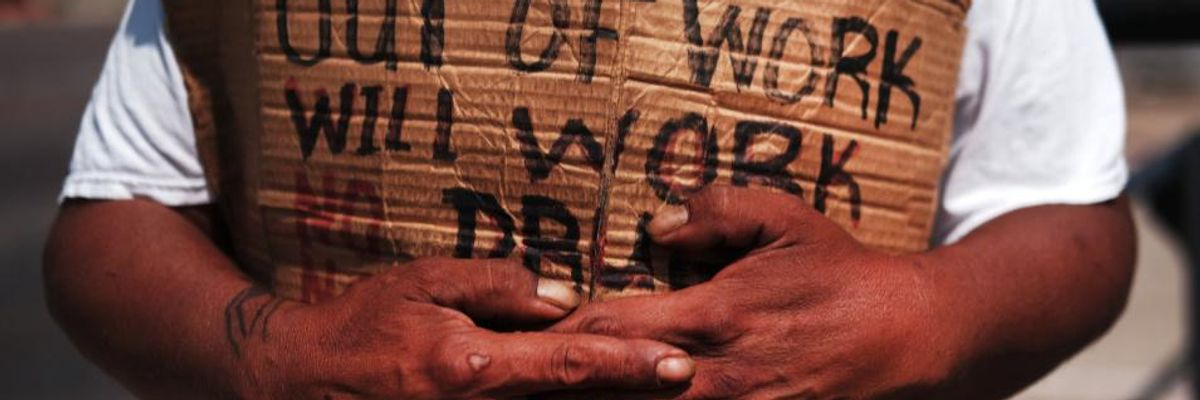It's happening again: Donald Trump is now attacking our public welfare system to score easy political points, wrongly tarring immigrants as a drain on our country--despite the fact that immigrants use these benefits at much lower rates, and receive much smaller amounts of support, than do American-born recipients. As an attorney who has spent 30-plus years protecting the rights of poor and homeless people, I have seen this ploy over and over again. I urge my fellow Americans not to fall for it this time.
No matter how the lyrics change, it's always the same song: Politicians attack public assistance programs because most of their constituents know very little about poor people and the programs that help them. These voters are easy marks for myths, lies and distortions. In this time of global instability, they are easily susceptible to pictures of the poor as the "other"--lazy good-for-nothings who don't deserve support, even in matters of life or death.
I saw this first when Ronald Reagan made anti-welfare attacks a big part of his campaigns. I was a young attorney and can clearly recall the anger and confusion I felt when he started telling stories about welfare queens in hot tubs eating lobster. Like our current president, Reagan played the race card with relish, drawing on Richard Nixon's "Southern Strategy," connecting poverty directly with skin color and character. His vicious visions of parasitic cons living off the system bore no resemblance to the hard-working, desperate families I worked with, for whom meager public benefits were the difference between living with dignity and living at all.
"No matter how the lyrics change, it's always the same song: Politicians attack public assistance programs because most of their constituents know very little about poor people and the programs that help them."But it isn't just Republicans who use the poor as pawns. New York City Mayor Ed Koch created mass homeless "shelters" that were only a few steps away from the most degrading concentration camps (and I should know, as I successfully sued the city to dismantle them). From the very beginning of his time as Mayor--in his 1978 inaugural speech, in fact--Koch used public benefits as a stalking horse, saying, "In the past, programs that were meant to help the needy ended up as bonanzas for the greedy." Koch's real thoughts about the poor, however, are best summed up in his own words: "If you can't afford to live here, move!"
In the 1990s, Newt Gingrich made welfare bashing a central part of his congressional leadership. He was so successful at spinning tales that President Bill Clinton--in fear of losing the election for his second term--gave in and signed the 1996 welfare bill. This bill put a limit of five years on federal public benefits, as though poverty has a short lifespan in this country. Clinton managed to undercut Gingrich, but at a terrible cost to the poor, who found themselves trapped in a cycle of poverty with little government support.
Soon, New York City Mayor Rudy Guliani would also find political gold in attacking welfare recipients. He painted them as shiftless moochers who were choosing to sleep on the streets. "We romanticized [homelessness] to such an extent that we invited people to do it," he once infamously stated. Giuliani had the innovative gall to argue that not only were benefits a waste of public dollars, they were morally corrosive to poor people themselves, making them lazy. Though I had seen these kinds of lies for many years at that point, I was still appalled to see him get away with it. And get away with it he did, dumping over 400,000 needy people from our public benefit rolls over the course of his administration. But at what cost to our to human decency? And at what cost to our neighbors and loved ones in need?
Through my practice representing poor and homeless people, I have gotten to know many who have benefited from our public assistance programs. Far from being the undeserving parasites that President Trump and his ilk paint them as, these are hard-working individuals in dire straits. When they don't have food, they suffer from hunger; when they don't have any place to live, they shiver through the night (and sometimes die); when they are cut, they not only bleed, but it gets worse--often much worse-- without medical care (and sometimes they die).
"Public benefit programs not only meet immediate, life-threatening needs, but also create more stable communities in the long term."
And the selfish truth is, helping them helps all of us. Public benefit programs not only meet immediate, life-threatening needs, but also create more stable communities in the long term. Some of these benefits are obvious. For instance, children who receive food assistance are nearly 20% more likely to graduate from high school than are similarly disadvantaged children left to struggle on their own. Moreover, every dollar spent by recipients generates $1.79 in economic activity and every $1 billion issued in food benefits creates 9,000 full-time jobs. But public benefits support the health of our nation in unexpected ways as well. For instance, if President Trump's proposed changes were to be enacted, hospitals around the country would lose an estimated $17 billion in Medicaid payments, critically damaging our already over-extended healthcare infrastructure.
For too long, Democrats have played defensive on public benefits, afraid to make an assertive case for their long-term utility out of fear of being painted as gullible, soft-hearted spendthrifts. It is time we reframed this conversation as a long-term investment in our nation as a whole, and an insurance program waiting to catch each and every one of us when catastrophe happens. Until we do, public benefits will remain an easy dog-whistle for any politician looking to demonize the already disadvantaged, whether those are immigrants, or people of color, or the mentally ill. Donald Trump is playing the same game as his mentors. We can't afford to fall for it again.
